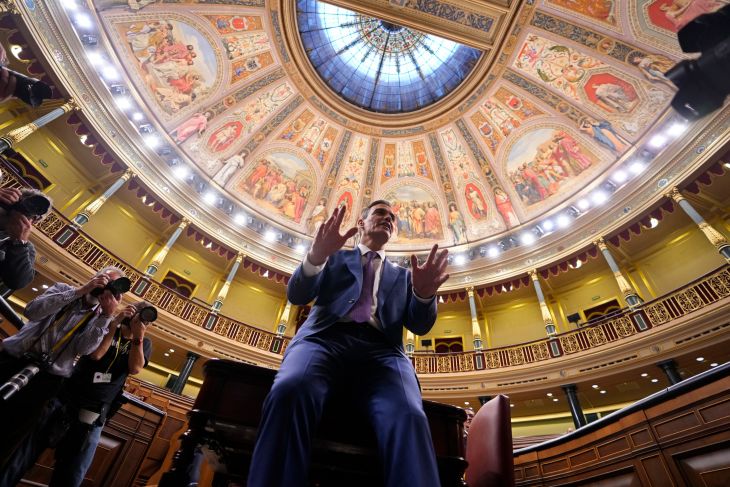The Irish poet William Butler Yeats once wrote “things fall apart; the center cannot hold; mere anarchy is loosed upon the world. The blood-dimmed tide is loosed, and everywhere the ceremony of innocence is drowned; the best lack all conviction, while the worst are full of passionate intensity”.
During the past few weeks, Spain has seen a polarization and division that have scared many citizens.
The new Spanish government was sworn in on November 17th with PSOE (Socialist) leader Pedro Sanchez once again Prime Minister.
The opposition right of center Partido Popular (PP) won a relative majority of seats in Parliament as well as a relative majority of the popular vote. However, its alliance with the extreme right wing party VOX precluded any ability it may have had to negotiate with some of the lesser parties to form a parliamentary majority.
PP leader Alberto Nuñez Feijóo spent most of his time accusing Sanchez of electoral corruption for not allowing the PP to form a government even though he could not get the support of a majority of seats in parliament.
This led to a few weeks of massive demonstrations across Spanish cities orchestrated by both blocs as they tried to pressure their respective positions on public opinion.
It has taken four months of hard negotiations to arrive at this new government. It consists of left of center parties as well as Catalan and Basque separatist parties.
Their major demands are amnesty for the Catalan leaders who organized an illegal referendum to create an independent Cataluña and Basque separatist demands for a constitutional change that would allow them as well to seek a mandate for separation.
Spain faces an existential crisis the likes of which have not been seen since the tragic 1936-39 civil war.
The PP seeks a highly unified Spanish state, a reversal of many of the progressive policies implemented by the PSOE such as abortion rights, respect for the LGBTQ community, the assisted dying program, addressing the significant amount of violence against women, and other policies that have put Spain at the forefront of liberalism and has curtailed the traditional power of the Catholic Church on government.
The PSOE managed to create a climate of fear against a possible PP-VOX partnership that could take Spain back to the Franco era. VOX is in lock step with the nationalist and social purity espoused by leaders like Hungary’s Viktor Orban and others on the extreme right of European politics who stand for “traditional” values and oppose immigration of any kind.
The problem facing Spanish democracy is that proportional representation gives a lot of power to marginal parties on both extremes that both major parties require to form a parliamentary majority.
Sanchez seems intent on fostering the separatist ideals of the Catalan and Basque nationalists without a clear limit as to what limits he is prepared to impose on their aspirations. To many Spaniards, this is tantamount to signing a pact with the devil to remain in power at any price.
The PP seeks to dampen separatist aspirations through measures that they have not defined. However, its VOX partners have said that their aim is to declare separatist and regional parties illegal on pain of imprisonment and revert to Franco era norms of governance.
Both parties are pandering to their followers’ fears. The PP speaks of the threat to Spanish unity of giving in to the demands of separatists, The PSOE posits that a vote for the PP is a return to the Franco era.
Can Spain survive this respective pandering and arrive at a centrist conclusion?
In a few weeks, four months of arduous negotiations with the nationalists to gain their support may seem like child’s play for Sanchez and his government.
Once he settles into governing a divided Spain, he must strike a balance between trying to meet his obligations to his separatist allies yet maintain a sense of unity that will keep VOX and its allies off the streets or worse.
In addition, he will have to face the military. The association of retired senior officers issued a demand on November 17th to the military high command that it overthrow the Sanchez government and call for new elections. Readers will recall that the Spanish Civil War began with an uprising by Spanish troops in Morocco led by General Francisco Franco.
The military view of Spain is that of a strong united country.
During the investiture debate, the separatist parties promised to hold Sanchez’s feet to the fire on amnesty and respect for their drive towards independence of Cataluña and the Basque country.
Sanchez than changed his discourse from one of “dialogue” with the separatists to one of “negotiations” with them, cementing in the minds of the right the dangers posed to Spanish unity.
It will be up to Sanchez to strike a balance between reality and expectations.
In this, King Felipe VI will have a major role to play.
His father, ex-King Juan Carlos, managed to bridge the two extremes by working closely with those at the center to create a peaceful transition from dictatorship to democracy, keep the military at bay, and avoid left-right violence or a return to the Spanish Civil War.
Abraham Lincoln once quoted scripture saying that a house divided against itself cannot stand.
Will Felipe VI have the same powers of persuasion, and will leaders and politicians of the center have the political will to strike deals that keep violence off the streets and ensure that the center does indeed hold?
That is the question many are asking themselves, and the answer will determine if the outcome can please enough people to keep Spain on an even keel.
Keep reading: A Time to Go
Edición: Fernando Sierra
Desaprender que la existencia tiene valor sólo si estamos produciendo
Lourdes Álvarez
El 'Lobo de Tepejil' anotó su quinto gol durante la victoria del Fulham 2-1 ante el Chelsea
La Jornada
